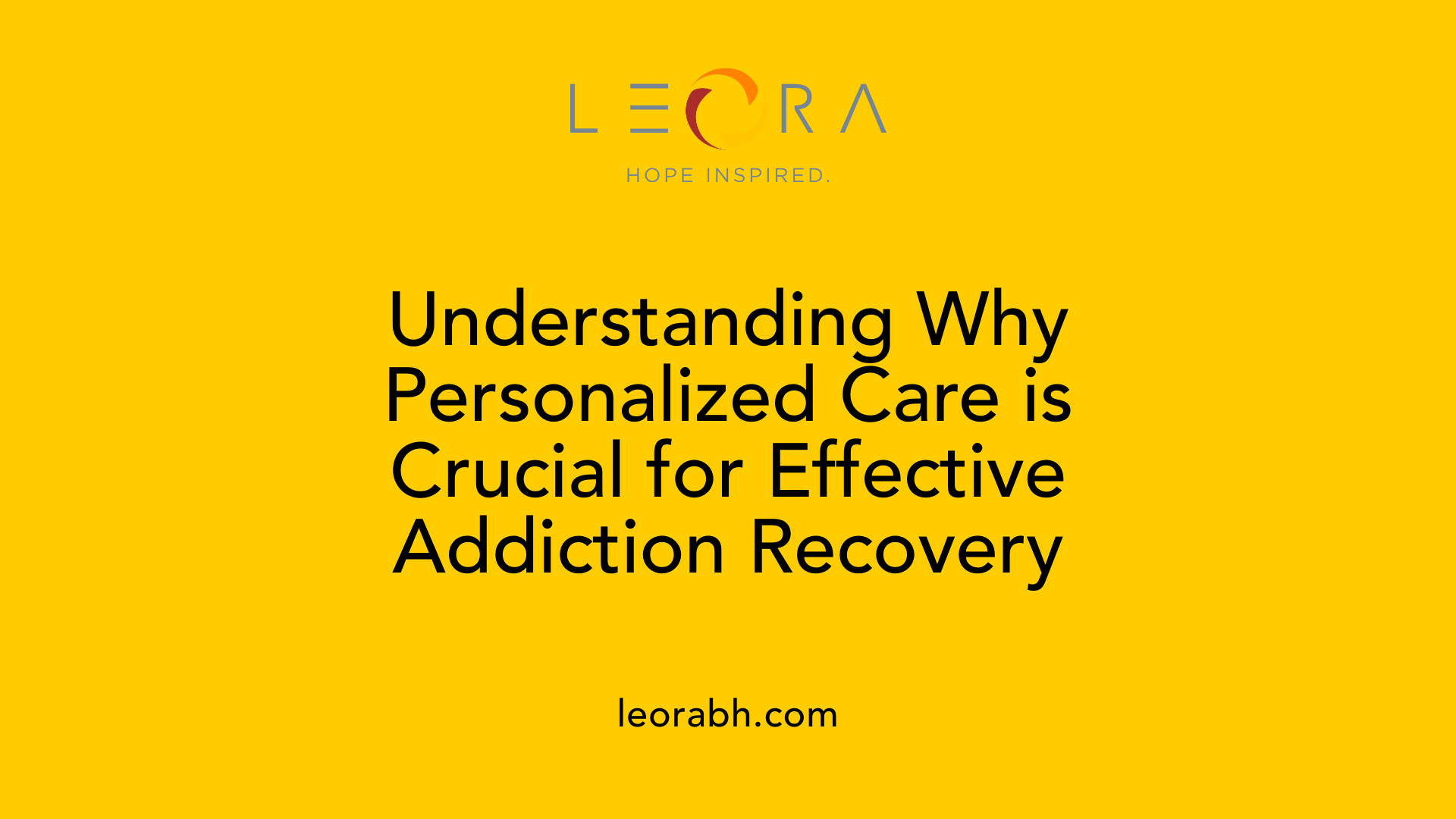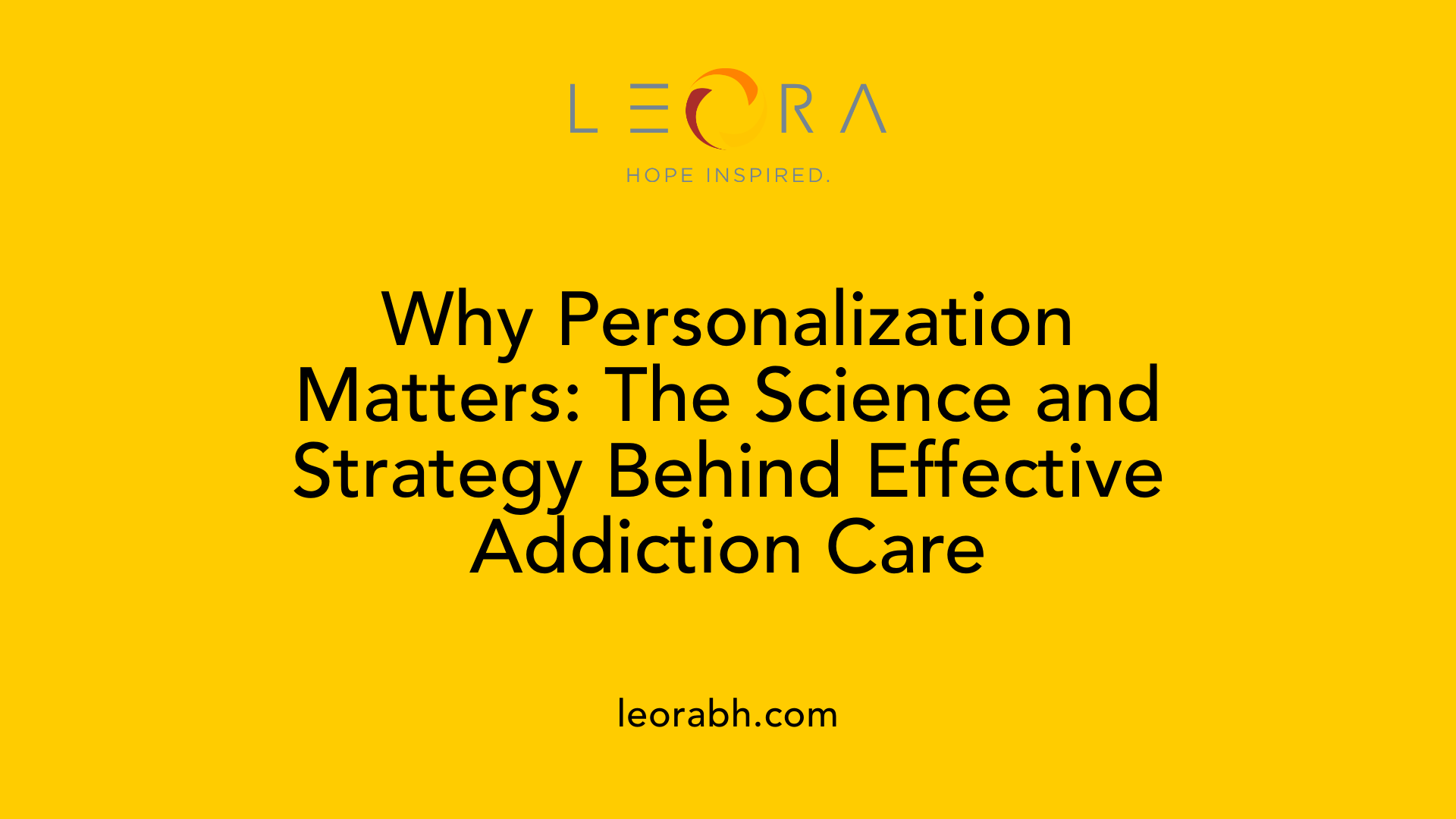Why individualized treatment plans matter in addiction recovery
Personalized Strategies Drive Better Outcomes in Addiction Recovery
Understanding the Power of Tailored Care in Combating Addiction
In the complex realm of addiction recovery, a one-size-fits-all approach often falls short of delivering sustainable results. Personalized or individualized treatment plans have gained recognition for their ability to address the unique biological, psychological, and social factors influencing each person's journey. This article explores why these tailored strategies are essential, how they are developed, and the profound impact they have on recovery outcomes.
The Significance of Individualized Care in Addiction Treatment

Why is individualizing a treatment plan important?
Creating customized treatment plans is crucial because every person experiences addiction differently. Factors such as genetics, mental health, social environment, and personal history influence how an individual navigates recovery. Personalized plans consider these elements, tailoring interventions like medication-assisted treatment, therapy, and holistic practices to fit each person’s unique needs.
By evaluating comprehensive profiles—including co-occurring mental health disorders and physical health conditions—clinicians can select the most appropriate therapies. For example, someone with trauma history might benefit from trauma-informed care, while another with severe physical health issues may require specific medical management. This holistic approach fosters a safer, more supportive environment that enhances engagement and adherence.
Custom plans also involve ongoing assessment and adjustments to adapt to the individual's evolving requirements. This dynamic process boosts motivation, improves retention, and increases the likelihood of long-lasting recovery. Ultimately, individualization in treatment creates a foundation conducive to both immediate and sustained healing, promoting better mental health outcomes.
How does a personalized treatment approach influence recovery outcomes?
A tailored approach impacts recovery by aligning therapeutic interventions with each person’s biological, psychological, and social factors. Through thorough assessments, clinicians can identify specific triggers, mental health co-morbidities, and personal goals, guiding precise treatment strategies.
Personalized care increases engagement by making treatment relevant and meaningful to the individual. This relevance encourages participation and compliance, which are vital for success. For instance, integrating medication management with behavioral therapy that addresses individual cravings and emotional responses can substantially reduce relapse risk.
Advanced data and decision-support tools further enhance treatment accuracy, ensuring plans remain flexible and responsive. When treatment aligns closely with personal needs, recovery rates improve, relapse decreases, and patients develop resilience and healthy habits that sustain sobriety over the long term.
Why are tailored approaches considered more effective for addiction treatment?
Targeted approaches excel because they address the specific circumstances shaping each person’s addiction. Standardized, one-size-fits-all treatments often overlook individual variations, reducing effectiveness.
Personalized plans incorporate diverse therapies, including evidence-based methods like cognitive-behavioral therapy (CBT), dialectical behavior therapy (DBT), and medication-assisted treatments such as buprenorphine or methadone. These strategies can be matched to the individual's particular patterns, preferences, and genetic makeup, making the intervention more relevant and potent.
Furthermore, by focusing on the person's goals and life context, tailored approaches enhance motivation and engagement. This heightened involvement increases the chances of completing treatment and maintaining sobriety. Research supports that personalized strategies result in higher success rates, lower relapse rates, and sustained improvements, asserting their prominence in modern addiction care.
| Factors Influencing Personalized Treatment | Description | Example Targets |
|---|---|---|
| Genetic and neurobiological markers | Biological data support treatment customization | Pharmacogenomics guiding medication choices |
| Mental health status | Mental health diagnoses influence therapy selection | CBT for depression co-occurring with addiction |
| Social environment and support | Family, community, and social influences shape interventions | Family therapy, peer support groups |
| Personal goals and preferences | Individual aspirations tailor motivational strategies | Focus on employment, relationships |
| Addiction severity and history | Level and history guide intensity of care | Detox, inpatient, outpatient |
This personalized approach enhances each step of the recovery journey. It accounts for physical health, psychological wellbeing, social support, and individual aspirations, cultivating a comprehensive, effective recovery process.
Components and Development of Personalized Addiction Treatment Strategies

What are the components and development steps involved in creating personalized addiction treatment strategies?
Crafting personalized addiction treatment strategies is a meticulous process that begins with a comprehensive assessment of the individual’s unique profile. This assessment involves evaluating the substance use history, mental health conditions, social environment, physical health, co-occurring disorders, and personal strengths. By understanding these factors, clinicians can determine the severity of addiction and identify specific intervention needs tailored to the person.
The core components of a personalized treatment plan include clear goal setting, selection of evidence-based therapies, and integration of medication-assisted treatments where appropriate. Goals are tailored to individual aspirations, such as restoring relationships, returning to work, or achieving sobriety milestones. Therapies like cognitive-behavioral therapy (CBT), motivational interviewing, and trauma-informed care are incorporated based on the individual’s psychological profile.
Medication options, such as buprenorphine or methadone, are used to manage withdrawal symptoms and cravings, especially in opioid addiction. These decisions are made considering the person’s medical history and treatment preferences.
The development process is collaborative, involving active participation of the patient in planning. This partnership ensures the treatment aligns with the individual’s motivations, readiness, and personal circumstances. Coordination among a multidisciplinary team—comprising physicians, counselors, social workers, and family members—is essential for a cohesive approach.
Further, strategies include addressing environmental and social factors, such as criminal background, employment, and support networks, which significantly influence recovery. Relapse prevention plans, ongoing support services, and family involvement are integrated to enhance resilience.
Holistic therapies, like mindfulness practices, nutrition counseling, and physical activity, support overall well-being and help address underlying issues.
Throughout recovery, continuous monitoring allows clinicians to evaluate progress and make necessary adjustments. Flexibility in interventions enables the plan to evolve in response to the person’s changing needs, emerging challenges, and milestones achieved.
In summary, developing a personalized addiction treatment strategy involves detailed assessment, goal-oriented planning, evidence-based intervention selection, collaborative development, and dynamic adjustments—each stage aimed at promoting sustained recovery tailored specifically to the individual’s profile.
The Rationale Behind Customized and Adaptive Treatment Approaches

What is the rationale behind customized addiction treatment?
Addiction is a highly personal and complex disease, affecting individuals in unique ways based on a multitude of factors such as genetics, mental health, personal history, and social environment. The traditional one-size-fits-all treatment models often fall short because they fail to address this individual variability.
Personalized addiction care aims to tailor treatment plans to meet each person's specific needs and circumstances. This involves thorough assessments that consider physical health, mental health, trauma history, family background, substance use patterns, and personal recovery goals. By understanding these unique factors, healthcare providers can design targeted interventions that address underlying issues like co-occurring mental health disorders or trauma, which are often pivotal in addiction.
Incorporating diverse therapeutic modalities—such as individual counseling, family therapy, relapse prevention strategies, and medication-assisted treatment—further enhances this tailored approach. This flexibility allows adjustments in therapy or medication based on the patient's progress and evolving needs, promoting higher engagement and better outcomes.
The role of scientific advances cannot be overstated. Biomarkers, genetic tests, brain imaging, and other neurobiological tools support clinicians in understanding each person's biological profile. These insights enable the customization of pharmacotherapy, making medications more effective and reducing adverse effects, thereby increasing the likelihood of long-term recovery.
The core rationale for personalized addiction treatment is to optimize the effectiveness of care by addressing specific causes and factors underlying each individual's addiction. This targeted strategy not only improves engagement but also enhances overall recovery success and reduces the chances of relapse.
Biological, genetic, and neurobiological considerations
Understanding the biological underpinnings of addiction is essential for tailoring treatment. Genetic studies, such as those by Karpyak et al. and Bierut et al., have identified markers that influence individual responses to medications and susceptibility to addiction. Neurobiological research, including studies like those by Lee et al., highlights how variations in brain structure and function, especially in neural systems responsible for impulse control, monitoring, and reflection, can predict treatment needs.
Markers such as single nucleotide polymorphisms (SNPs), neurochemical levels, and brain connectivity patterns guide clinicians in selecting appropriate pharmacological agents or behavioral strategies. For example, individuals with specific genetic profiles may benefit from medications like naltrexone or acamprosate more than others.
Including assessments of physical health, mental health, and neurobiological parameters ensures a holistic approach that targets the root causes and vulnerabilities associated with addiction. This comprehensive understanding facilitates the creation of highly personalized treatment plans aimed at achieving lasting recovery.
Integration of advanced neuroscience and biomarkers
Innovations in neuroscience provide powerful tools to refine addiction treatment on a personal level. Brain imaging technologies, such as functional MRI and PET scans, reveal neural activity and connectivity patterns associated with addiction and recovery readiness.
Biomarkers—measurable biological indicators—assist in predicting treatment response and monitoring progress. They can include genetic markers, neurochemical levels, or physiological measures relevant to addiction pathways. Employing these biomarkers helps identify the most effective interventions tailored to the individual's neurobiological profile.
Emerging research advocates for integrating these technologies into routine clinical practice, making it possible to design more precise and effective personalized treatment plans. This integration improves understanding of the neurobiological basis of addiction, supports early detection of relapse risks, and guides adjustments in therapy.
Role of clinical decision support systems and informatics
Harnessing information technology enhances personalized addiction treatment through clinical decision support systems (CDSS) and informatics. These systems compile vast amounts of data—from genetic, neurobiological, and psychosocial assessments—and analyze them to assist clinicians in making evidence-based decisions.
CDSS can provide treatment recommendations customized to the patient’s biological and psychological profile, suggest optimal medication regimens, and flag potential risks. This not only increases accuracy but also expedites decision-making processes.
Moreover, electronic health records and mobile health apps enable continuous monitoring of treatment progress, adherence, and relapse triggers. Functional informatics therefore plays an integral role in adapting treatment plans dynamically, ensuring they remain aligned with the patient's evolving needs.
Overall, the convergence of neuroscience, biomarkers, and informatics creates a new paradigm in addiction care—one that emphasizes precision, biological understanding, and real-time adaptability.
| Aspect | Description | Significance |
|---|---|---|
| Genetic Markers | SNPs, gene variants | Tailor pharmacotherapy, predict response |
| Brain Imaging | MRI, PET scans | Visualize neural activity, guide interventions |
| Neurochemical Tests | Neurotransmitter levels | Assess neural pathway functioning |
| Data Systems | CDSS, EHRs, mobile apps | Support decision-making, ongoing monitoring |
This integrated, biopsychosocial approach ensures that addiction treatment moves away from generic models toward strategies that respect individual biological and psychological differences, ultimately leading to more successful recovery journeys.
Impact of Personalized and Flexible Treatment Plans on Long-Term Recovery

How does personalized treatment help in addressing specific needs, such as anxiety?
Personalized treatment plays a crucial role in effectively managing individual differences, especially in addressing conditions like anxiety that often co-occur with addiction. This approach begins with comprehensive assessments of each person's psychological profile, substance use history, and personal circumstances. Based on this information, clinicians develop tailored strategies that may include cognitive-behavioral therapy (CBT), mindfulness practices, or targeted medication adjustments.
Incorporating genetic testing and neurobiological parameters can further refine treatment, ensuring interventions align with the individual's biological responses. Engaging patients actively in their care plans enhances motivation and adherence, as they feel their unique needs and preferences are acknowledged.
Continuous monitoring allows clinicians to observe progress, identify emerging issues, and adapt treatment elements accordingly. For example, if anxiety symptoms persist or worsen, adjustments in therapy modalities or medication can be implemented promptly. This dynamic flexibility not only improves symptom relief but also reduces the risk of relapse.
Overall, personalized anxiety treatment creates a supportive and empowering environment. It addresses specific triggers and stressors through customized coping strategies, fostering resilience. By focusing on the person's unique psychological landscape, such tailored plans significantly increase the probability of achieving sustained recovery and improved mental health.
Increased treatment engagement and retention
When treatment is customized to meet the individual's goals, values, and circumstances, patients are more likely to stay engaged. Personalized approaches make therapy more relevant and motivating, reducing dropout rates. Patients who see their specific needs being addressed are more committed to the process.
Reduction in relapse rates
Targeted interventions that consider all aspects of a person's life—including genetic predispositions, mental health, and social environment—lead to better identification of relapse triggers. This foresight allows for preventive measures and planning, decreasing the likelihood of relapse.
Continuous monitoring and plan adjustments
Effective recovery relies on regular evaluation and flexibility. Using predictive tools and ongoing assessments, clinicians tailor treatment components—such as medication dosages or therapeutic focus—ensuring the plan evolves with the patient's progress.
Long-term support systems and aftercare
Personalized recovery extends beyond initial treatment, incorporating long-term support strategies like family therapy, support groups, and community resources. These tailored support systems help maintain sobriety, manage co-occurring conditions, and foster resilience.
Summary of how personalized treatment impacts long-term recovery:
| Aspect | Effect | Additional Details |
|---|---|---|
| Engagement | Higher retention rates | Customized therapy increases relevance and motivation |
| Relapse Prevention | Lower relapse rates | Targeted, biologically-informed interventions address root causes |
| Monitoring | Adaptive plans | Regular evaluation ensures treatment keeps pace with recovery |
| Support & Aftercare | Sustained sobriety | Personal support networks promote resilience and address ongoing challenges |
In conclusion, adopting individualized and flexible treatment plans significantly enhances the effectiveness of addiction recovery. By focusing on each person's unique needs—biological, psychological, and social—clinicians can foster lasting change, helping individuals rebuild their lives with confidence and resilience.
The Future of Addiction Treatment Lies in Personalization
As scientific advancements continue to shed light on the biological and psychological underpinnings of addiction, the importance of individualized treatment plans becomes increasingly evident. Personalized strategies not only improve immediate treatment outcomes but also foster sustainable recovery by addressing the complex, multifaceted nature of addiction. By integrating comprehensive assessments, emerging biomarkers, and patient-centered care, clinicians can design flexible, effective treatment pathways that adapt to each person's evolving needs. The future of addiction recovery hinges on these tailored approaches, promising better success rates, reduced relapse, and healthier live-long sobriety for those affected by addiction.
References
- Precision in Addiction Care: Does It Make a Difference? - PMC
- Why Have Individualized Treatment Plans for Substance Abuse?
- Benefits of Individualized Addiction Treatment Plans | Impact ...
- What is Included in an Individualized Treatment Plan?
- Why Personalized Treatment Plans Are Key to Success in Sobriety
- Addressing Anxiety and Addiction: Personalized Treatment
- Understanding the Importance of Individualized Treatment Plans at ...
Find Your Inner Light
Related Articles
Schedule an Assessment
Leora Behavioral Health provides comprehensive treatment services, including ambulatory detox, mental health IOP, and SUD IOP, to support your journey toward lasting recovery.
Our caring team will guide you through the admissions process and create a personalized treatment plan tailored to your unique needs. We welcome walk-ins. If you or a loved one is struggling, reach out today. We’re here to help.


.svg)




.svg)
.svg)
.svg)
.svg)
